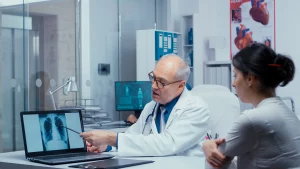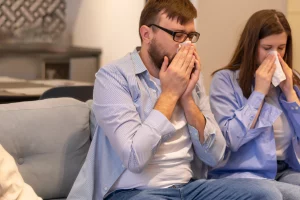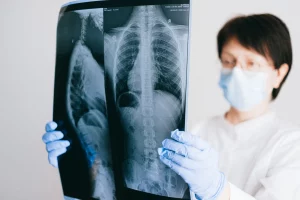Respiratory System Functions
The respiratory system is the body’s network for taking in oxygen, getting rid of carbon dioxide, and other functions related to breathing. Lungs are the primary organs of respiration, performing many essential bodily functions, including gas exchange, smell detection, voice production, bronchoconstriction, and bronchodilation. One of the critical functions of lungs is that they take in oxygen from the air we breathe and expel carbon dioxide and other waste products produced by cells during energy production. Other of the functions of respiratory system include:

- Gas Exchange: One of the respiratory system’s primary functions is to provide oxygen to the body and remove carbon dioxide from it. During respiration, air enters through the nose or mouth, travels down the airways, and reaches tiny sacs in the lungs called alveoli. Oxygen passes from these alveoli into blood vessels and is then carried throughout the body for energy production. Simultaneously, carbon dioxide leaves the cells and enters the bloodstream, which is then transported back to the alveoli and expelled through exhalation.
- Smell: Another of the critical functions of the respiratory system is smell. Tiny receptor cells in our nasal cavity are responsible for detecting smell molecules in airborne substances such as food odors and environmental toxins.
- Voice Production: The respiratory system also plays a role in producing vocal sounds through the movement of air from the lungs to the vocal cords and then out through the trachea and mouth.
- Bronchoconstriction/Bronchodilation: Smooth muscles in our bronchi can contract or relax, allowing us to control airflow into our lungs. This function helps regulate breathing rate and depth while also allowing us to cough and sneeze, which helps prevent infection by expelling pathogens from the body.
The respiratory system is an integral part of many other body systems, such as cardiovascular, endocrine, musculoskeletal, immune, digestive, and nervous systems, making it essential for the body to function correctly. It is important to take care of the respiratory system by avoiding smoking, air pollution, and other environmental toxins and ensuring regular exercise and plenty of rest. Maintaining a healthy lifestyle can help keep your respiratory system functioning at its best.
Respiratory System Diseases
Unfortunately, there are many diseases and disorders associated with the respiratory system. Respiratory system diseases range from common infections such as the flu or a cold to chronic conditions such as asthma, COPD (Chronic Obstructive Pulmonary Disease), pulmonary fibrosis, cystic fibrosis, and even severe ones like lung cancer.

- Flu or Cold: The flu and the common cold are viral infections affecting the respiratory system. The symptoms of both diseases can range from mild to severe but typically include fever, body aches, sore throat, runny or stuffy nose, coughing, and congestion.
- Asthma is a chronic inflammatory disorder characterized by episodes of airway obstruction caused by bronchoconstriction or inflammation in the lungs. Symptoms may include wheezing, shortness of breath, chest tightness, coughing, and difficulty breathing.
- COPD includes two medical conditions, emphysema, and chronic bronchitis, that cause airflow blockage in the lungs, making it difficult to breathe normally. Common symptoms include shortness of breath, wheezing, coughing, and chest tightness.
- Pulmonary Fibrosis: Pulmonary fibrosis is a severe lung disease characterized by forming scar tissue in the lungs, leading to difficulty breathing, fatigue, chest pain, and even death if left untreated.
- Cystic Fibrosis: Cystic fibrosis is an inherited disorder that affects the respiratory system and other organs, including the pancreas and liver. Symptoms include frequent coughing, shortness of breath, and chest and sinus infections.
- Lung Cancer: Lung cancer is one of the most severe types of cancer, affecting thousands of people worldwide yearly. The most common symptoms include coughing up blood or mucus and wheezing.
Causes of Respiratory Diseases
Respiratory illnesses can be caused by viruses, bacteria, or other environmental toxins that can irritate or damage the lungs making it harder for them to function correctly. If you experience any of these symptoms, it is essential to visit your doctor so they can diagnose the problem and provide proper treatment. Early diagnosis can help manage the disease and prevent further complications.
It is essential to know how to keep the respiratory system healthy and recognize any signs or symptoms that could indicate a problem so you can get proper medical treatment if necessary. Respiratory diseases are expected, but individuals can manage them effectively with appropriate care, lifestyle changes, and medical supervision.




